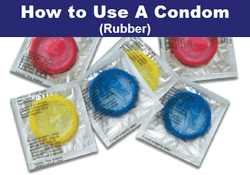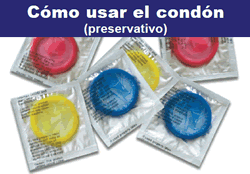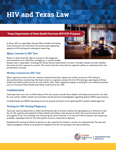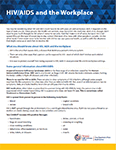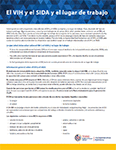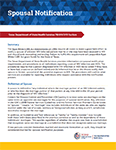Living with HIV
Testing Positive for HIV: What’s Next?
Getting a positive HIV test result can be overwhelming. Even if the result was expected, a positive HIV test will change your life.
You may feel scared, angry, depressed or numb. You might have many questions or you might just have one or two. All of these reactions are normal.
Below is a list of first steps you can take to stay healthy while living with HIV. This page is not a substitute for a doctor visit, but it may guide you to find the help you need.
Remember, you don’t have to face HIV alone. There are health care and social service providers all over Texas who are ready to help.
Getting into Care
The first step to staying healthy while living with HIV is seeing a doctor. New treatment options can help people with HIV stay healthy and live long lives. The sooner you find out you have HIV, the more options you have for treating it.
Even though you may not feel sick, you need to learn how HIV is affecting your body. The agency where you received your test result may check back to make sure you have made contact with a doctor. That’s how important getting into medical care is.
Finding a doctor who specializes in HIV is vital. HIV providers are comfortable answering questions you may have about HIV and how to stay healthy. Make your appointment as soon as possible. The agency where you received your test result may have already scheduled an appointment for you.
If not, contact your health insurance company or your primary care doctor to ask for a referral. Or, you can ask other people who are living with HIV where they get medical care.
Finding a Case Manager
 If you don’t have insurance, or have trouble getting help from your insurance company, a case manager can help you. Case managers are trained to help people with HIV get in and stay in health care. Case managers can also help you get other services that support your long-term health. Services like housing, transportation, mental health counseling, and substance abuse treatment can help you manage HIV.
If you don’t have insurance, or have trouble getting help from your insurance company, a case manager can help you. Case managers are trained to help people with HIV get in and stay in health care. Case managers can also help you get other services that support your long-term health. Services like housing, transportation, mental health counseling, and substance abuse treatment can help you manage HIV.
If you don’t have an appointment with a case manager, make one with an agency near you. The agency will schedule an appointment for you to meet with a case manager. There is no charge for case management.
At your first visit, the case manager will determine if you are eligible for any services. He or she will also help you find a doctor if you need one. When you call for an appointment, the case manager may tell you about lab tests to have done before your first visit.
There are several documents you should bring to your first appointment:
- Proof of income (such as a pay stub or unemployment statement). If you do not have any income, your case manager will help you document this.
- Proof of insurance.
- Proof of Texas residency (like a Texas Driver License, Texas ID card, mortgage or lease in your name, a utility bill in your name, a letter verifying your stay in a shelter, or a letter sent to you at a Texas address).
- Photo ID or two other forms of ID.
- Proof of HIV status (such as a test result).
Because these items may take time to obtain, you should begin to gather them before your appointment. If you do not have all your documents, you should still go to your appointment. Your case manager can also help you obtain these documents.
At your first visit, your case manager will explain agency policies and ask questions about your life. These questions may feel very personal. The answers you give are confidential. Your information will only be shared with people who need to know to provide services.
Telling Your Partners
Anyone you’ve had unprotected sex with needs to know they have been exposed to HIV so they can get tested. Because HIV is passed through blood, anyone you’ve shared needles or works with needs to know, too.
Partner services programs at your local health department can help you tell sex and needle-sharing partners. They can also tell partners for you without using your name.
View these pamphlets to learn more about telling your partners.
Protecting Yourself and Others
Not having vaginal, anal or oral sex and not sharing needles remain the only sure ways to prevent transmission of HIV. If you are sexually active, or if you inject drugs, think about steps you can take to avoid passing HIV to others.
- Always use latex condoms. When used correctly, condoms can prevent the spread of HIV and many common sexually transmitted diseases (STDs). View these pamphlets to learn more about using condoms.
- Avoid HIV reinfection. HIV-positive people can be infected with HIV again, which can lead to poorer health outcomes.
- Avoid STDs. Having an STD makes it easier to transmit HIV to others.
- Don’t share needles. Use a new, sterile needle and syringe with sterile water every time you inject. If you can’t do this, learn how to clean your needles and works with bleach and water.
You cannot give someone HIV through casual contact such as:
- Living, working or going to school with someone
- Shaking hands, hugging or kissing
- Sneezing or coughing
- Sharing food, plates, cups or forks
- Using the same toilet, tub or swimming pool
HIV and Pregnancy
If you are pregnant or think you may be pregnant, there are medicines you can take to keep your baby from getting HIV during pregnancy. Talk with your doctor now about treatment options for yourself and your baby.
View these pamphlets to learn more about HIV and pregnancy.
Staying Healthy
People sometimes wonder what they can do right away to manage HIV. Because HIV is an immune disease, any steps you can take to help your immune system can be helpful.
- Stop smoking. This is the single biggest step you can take to improve your health. Ask your doctor about ways to help you quit. Visit yesquit.org to learn even more ways to kick the habit.
- Stop or cut down on drinking. Alcohol can harm your liver, especially when combined with certain HIV medicines.
- Get enough sleep. Not getting enough sleep can weaken your immune system.
- Get in shape. Exercise is a great way to maintain health and reduce stress.
- Eat healthy foods. Eat more fresh fruits and vegetables and whole grains. Be sure to drink enough water, too.
- Reduce stress. High levels of stress can worsen your health. Manage your stress by exercising, joining an HIV support group or doing activities such as meditation or yoga to help you relax.
- Get help for mental health issues. Depression, anxiety and other mental health issues can make it harder to stay healthy while living with HIV. An HIV case manager can provide referrals for mental health services in your area.
- Get help for alcohol and drug problems. Heavy drinking and drug use also make it harder to stay healthy while living with HIV. If you’re ready to get clean, an HIV case manager can help with referrals.
Looking Forward
Learning you have HIV is a lot to process, but you don’t need to come up with all the answers right away. Take the time you need to figure out what’s best for your long-term health.
Don’t be afraid to ask for help. Friends, family, counselors, spiritual leaders and other people living with HIV may all be sources of comfort and strength. Think about who can support you in living with HIV.
DSHS Resources
Regional Resources
Austin – AustinHIV – A guide to HIV services in the Austin area, including Bastrop, Caldwell, Hays, Travis, and Williamson counties.
Dallas/North Texas – Ryan White HIV Services in the Dallas Planning Area – A guide to services for people living with HIV and AIDS in Dallas County and surrounding areas (English/Spanish).
East and Southeast Texas – Houston Area Ryan White Planning Council – A guide to services for people living with HIV in East and Southeast Texas, including Beaumont/Port Arthur, Galveston, Tyler/Longview, Lufkin, Nacogdoches, and Texarkana.
Fort Worth/Abilene/Wichita Falls – North Central Texas HIV Planning Council – A list of HIV services provided in Fort Worth, Abilene, Wichita Falls and surrounding areas.
Houston – Houston Area HIV/AIDS Resource – Information about HIV/AIDS services in the Greater Houston area from the Houston Area HIV Services Ryan White Planning Council (English/Spanish).
San Antonio – Services in the San Antonio Transitional Grant Area – A list of HIV services in the San Antonio area.
West Texas/Panhandle – PanWest Resources – HIV services provided in West Texas and the Panhandle, including El Paso, Midland/Odessa, Lubbock and Amarillo.


